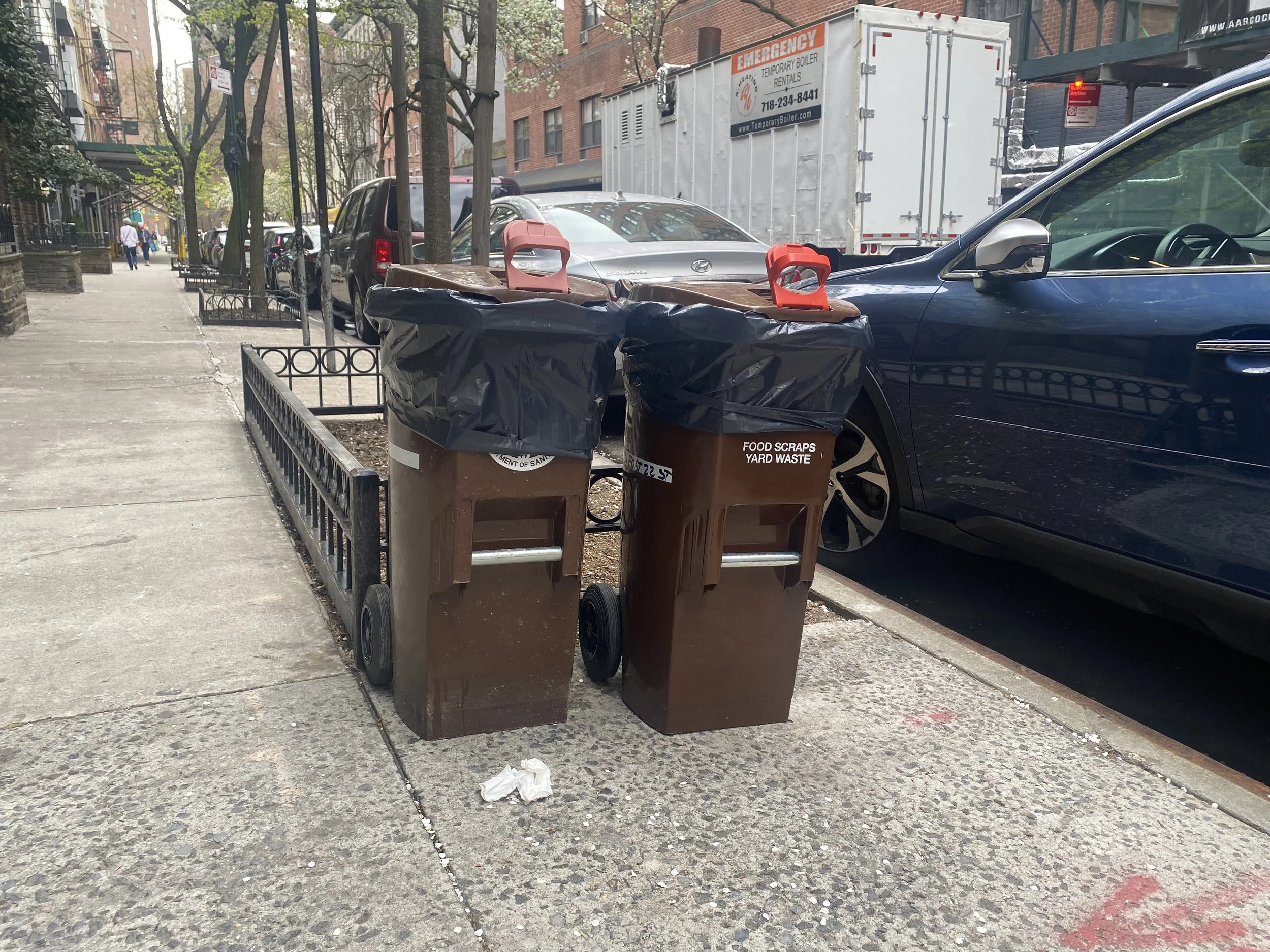Brown Bins Belong: NYC Composting Overview
Article by Anthony R.
Why Compost?
Currently, food waste is one of the biggest sanitary and environmental issues in NYC. In New York State, food waste creates 120,000 metric tons of carbon dioxide equivalents in the atmosphere each year, and globally, the 1.3 billion tons of food waste per year account for almost 10% of all greenhouse gas emissions.[1] Additionally, 68% of all food thrown out in the city is considered still edible at the time of its disposal, equating to about 5.4 pounds of edible food per week thrown out by the average household.[2] For reference, the average household in the U.S. as a whole only wastes 3 pounds of food per week, equating to about 2.1 pounds of edible food.[3]
A large amount of edible food waste thrown out comes from grocery stores and restaurants, which is a completely different, more industrial issue on its own. However, for inedible food waste and biodegradable food-related items that are commonly thrown away, a great, environmentally-friendly solution would be to compost! Along with preventing food waste, compost helps to conserve water, reduce greenhouse gas emissions, and prevent runoff of pollutants.[4] So if you’ve been seeing brown compost bins around the city recently, don’t ignore them! Instead, make sure to make the most of them by composting food scraps, biodegradable utensils/trays, pizza boxes, and food-soiled papers.
NYC’s Efforts
While the city has taken steps to acknowledge and promote composting, are they really enough? As of now, the New York City Dept. of Sanitation has made curbside composting an available service to all NYC residents, and compost bins are picked up every week along with the recycling bins. Starting on April 1st of this year, composting and separation of compostable waste have been mandatory by law, and anyone who does not oblige to these terms will be fined.[5] It's not as if the city is only being helpful, though. While Mayor Adams has restored $6.25 million in funding for the movement, GrowNYC, a major NYC composting stakeholder, has stated that “The new, one year discretionary funding that GrowNYC received is 10% of our previous zero waste budget and will not allow us to re-launch the program we had before”.[6] Also, one of the city’s longest running composters, Big Reuse, has been evicted from their base of operations under the Queensboro Bridge in favor of a parking lot. How ironic.
The Problems
According to the NYC 2025 Fiscal Year-To-Date Report on recycling statistics, organic recycling (compost) accounts for less than 1% of all curbside pickups. A survey conducted by lawnstarted food NYC residents sheds light on the reasons for this.[7]
About half of NYC residents surveyed this year confidently say that they understand the NYC composting program, and only 44% of people actually compost.
The majority of those who don’t compost daily cite lack of time, lack of space, or odor concerns.
Of those who don’t compost at all, 56% of people claim it is due to lack of accessible knowledge.
About a third of people say that they would compost if they had better access to bins, and another third of people cite monetary incentives as something that would make them compost.
One of the main issues with NYC’s current composting program is the lack of brown bins in certain areas – like the south Bronx, uptown Brooklyn, and deep Queens – and the fact that if a compost bin is not readily available near you, you have to go through a paid ordering process with DSNY (one compost bin costs over $40). To improve the program, the government needs to strategically place compost bins in areas of the city that do not have access to them at the moment, and improve composting infrastructure in neighborhoods that are experiencing composting droughts. Furthermore, the government should be way more public about the initiative, rather than working on it in silence, preventing many people from getting the information that they need to compost effectively. This would involve posting more about it, putting up flyers or electronic billboards to spread the word, and possibly holding online sessions and educating property owners about how to implement composting in their house/building.
Conclusion
So what should you do? Besides understanding why composting is important and getting into the habit of composting when you can, if you live in an apartment and don’t have easy access to composting, talk to your super / the building administration about getting started with the process. If you have the facilities and believe that it would benefit your community, order a composting bin from www.bins.nyc. Above all that, make sure you know how/what to compost, and educate your peers / neighbors!
End Notes:
“How Composting Can Reduce Our Impact on the Planet.” UNEP, 27 July 2021, www.unep.org/news-and-stories/story/how-composting-can-reduce-our-impact-planet.
Melissa Gallanter, RD. “Food Waste: Food by the Numbers - NYC Food Policy Center.” NYC Food Policy Center, Hunter College, 25 Mar. 2021, www.nycfoodpolicy.org/food-waste-food-by-the-numbers/.
Andrea Collins and Darby Hoover, “Additional Research on Household Food Waste,” NRDC, August 2, 2024, https://www.nrdc.org/bio/andrea-collins/additional-research-household-food-waste.
“Composting.” US EPA, 27 Feb. 2025, www.epa.gov/sustainable-management-food/composting#:~:text=Compost%20Enriches%20and%20Builds%20Healthy%20Soil&text=Conserves%20water%20and%20reduces%20water,on%20chemical%20fertilizers%20and%20pesticides.
“Curbside Composting.” Curbside Composting - DSNY, www.nyc.gov/site/dsny/collection/residents/curbside-composting.page.Accessed 16 Mar. 2025.
“NYC Council Restores Community Composting in FY2025 Budget.” BioCycle, 12 July 2024, www.biocycle.net/nyc-council-restores-community-composting-in-fy2025-budget/.
Maive, Sav. “The Dirt on Big Apple Composting: 2025 NYC Survey.” Lawnstarter, 10 Dec. 2024, www.lawnstarter.com/blog/studies/nyc-compost-survey/.


